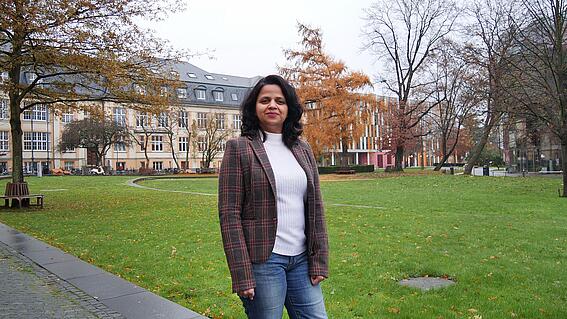Where did you study before coming to Bucerius Law School?
I completed my Bachelor of Electrical and Electronics Engineering at India. Out of interest, I utilized my time during the Covid 19 period to learn law, this became the driving factor to pursue my MLB at Bucerius.
Why did you decide to study law and business after your degree in engineering?
Ignorantia Juris Non Excusat is the perfect maxim which explains why it is so crucial to learn the law of your own country and the countries with whom you intend to do business. Technically my first encounter with the legal sphere was in one of my previous projects, where I led the IT merger between two companies, and the second one was when I had to deal with compliance policies related to a major project affecting many stakeholders.
These instances strengthened my belief that we can’t see businesses running in silos without understanding how those business decisions would be affected by the various regulations of respective countries with whom we transact.
How does your background in engineering benefit you now?
The beauty of MLB Program is its diversity. Not only engineering, but economics and business backgrounds would equally benefit from this course, which is presumably thought of as being only law students oriented.
Coming from engineering, I am a big fan of diagrams and flowcharts, and prefer simplifying the concepts using the same. This helped me grasp the complex interaction between various legal systems and business processes at ease.
You have some work experience already. Where did you work before?
I choose consultancy as my favored area for career growth, as it gave me the opportunity to learn many things over a short period of time. It taught me to be a generalist and observe problems at an arm’s length before deep diving into technicalities.
I’ve worked for over 10 years in the IT, Energy and largely in Aviation sector that involved interaction with clients across UK, France, Germany, Spain and India.
What triggered your decision to study for a master’s degree now?
Pursuing higher studies had been on my mind since a few years. With an experience in project and portfolio management in business improvement projects, I was craving to learn something new which would give me an overall picture of an entrepreneur’s life.
Master's in Business and Law is the perfect combination, one equips you with factors to be considered while making business decisions, the other helps you understand the boundaries for those decisions, both combined help in taking the right direction for your decisions.
In what way is your work experience an advantage to your current studies?
I think both has its pros and cons. Sometimes coming directly from academics might also be of help, as you are better prepared for examinations. Learning and reproducing concepts does become difficult with too much gap in between, so they have an advantage at that. For me, having worked in projects which dealt with management of projects, suppliers, risk, change, business continuity, service etc, helped relate to the concepts and draw parallels from real life.
Secondly, having worked on diverse projects with people of different backgrounds and cultures has improved my interpersonal skills, which are a definite advantage here, since many of the assignments involve group work. Thirdly, time management! This is a very intensive program which demands a lot of your time and effort, being well prepared with what is anticipated of you, helps you achieve your commitments.
What do you find to be the biggest differences between India and Germany?
Germany and India have very similar values and ethics. Instead of differences, they complement each other well. There are some places though, where they can share their respective knowhows. India is a duty-oriented society and Germany a right oriented one, which reflects in the work culture.
At India, the general tendency is to keep working throughout the year, it is work-life, in that order. One doesn’t realize the importance of a vacation till they experience it, which is good at Germany, giving priorities to personal life along with professional one.
Sunday’s “Ruhetag” is a concept unthinkable of in a busy country like India. Though there is a religious reason behind it, I am hopeful, with growing awareness and globalization, in general this would be appreciated across the world. Another thing which amuses me, is the automation, just one farmer managing a field of hectares.
India is advanced in terms of technology like UPI/GPay banking, speed and prices of internet. Germany still follows the traditional “Überweisung” system where bills are required to be paid via bank transfer 20 days after the actual transaction! On a lighter note, culinary classes is a good idea. Cooking is an art, I do not mean chilli alone, but the magic of spices and variations in vegetarian delicacies is something very unique to India. For Germans, vegetarian would end at Kartoffel Salat, Kartoffel Suppe and Kartoffel Puffer.
How do you like Hamburg?
I love Hamburg! Despite having grey clouds 11 months of the year. Each city where I lived is unique and special in its own way. Hamburg has good public transport, nice people and it is clean and green. It is modern, yet can provide you with calmness.
Bengaluru is spread over a large area; the city is crowded and full of life. Being cosmopolitan, you get a great shopping and dining experience there. Belagavi is my hometown, the place where I grew up and completed my bachelors, its warmth and beauty can’t be matched, but that is obvious for “native”, isn’t it?
Do you plan on staying here in Hamburg after graduation?
Oh yes! I have settled in Hamburg with my family since 2007, and would continue, at least in the near future, living in this beautiful city, which I now call my home.

